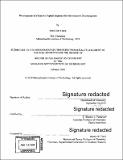Development of a reactive peptide sequence for site-selective bioconjugation
Author(s)
Tuang, Suan Lian.
Download1221004680-MIT.pdf (26.21Mb)
Other Contributors
Massachusetts Institute of Technology. Department of Chemistry.
Advisor
Bradley L.Pentelute.
Terms of use
Metadata
Show full item recordAbstract
Achieving catalyst-free, site-selective modification of proteins in water is a significant challenge in chemical biology. Issues of residue specificity, site-selectivity, reagent stability, and reaction rate are pervasive in this field, and despite advances over the past few decades, achieving fast, pinpoint modifications of complex molecules remains a tremendous obstacle. Herein, we describe the development of a nine-amino acid motif (Met-Cys-Pro-Phe-Leu-Pro-Val-Val-Tyr) termed engineered reaction (EnAct) tag. The EnAct interface, discovered by iterative screening of peptide libraries, consists of a reactive peptide (EnAct tag) that undergoes rapid (second-order rate constant, k ~ 150 M⁻¹ s⁻¹) nucleophilic aromatic substitution with a perfluoroarene-containing peptide (EnAct probe). Bioconjugation reactions centered on peptide interfaces are emerging as promising strategies to prepare homogeneous biological conjugates, and our results with the EnAct interface represent a 210-fold increase in reaction rate over the previous standard for this class of cysteine arylation. Furthermore, the EnAct sequence consists of all-natural amino acids and thus enables the facile genetic engineering of the sequence onto proteins of interest. We disclose here the incorporation of the EnAct sequence at the C-termini of the IgG antibody trastuzumab heavy chains, which were subsequently conjugated to the EnAct probe with excellent site-selectivity, despite the 32 other Cys residues on this protein. Remarkably, this system's rapid kinetics enabled quantitative conversion in 1.5 hours and at lower substrate concentrations. Finally, this bioconjugation reaction is still selective even in the complex environments of cell lysate mixtures, illustrating the enhanced selectivity and rapid reactivity of the EnAct interface. The appreciable increase in cysteine arylation rate and selectivity achieved with the EnAct sequenced represents a new standard for site-selective bioconjugations using peptide interfaces. To explore the versatility of the reactive peptide sequence, we found that this reactive peptide enabled aqueous arylations of Cys with small molecule electrophiles in mostly water, which was not previously accessed with this class of electrophiles. Furthermore, the perfluoroarene on the probe was found not only to function as an electrophile for thiol arylation, but also to offer a handle for easy elimination to form dehydroalanine. Thus, the EnAct system represents a powerful, versatile, and selective bioconjugation method.
Description
Thesis: Ph. D., Massachusetts Institute of Technology, Department of Chemistry, February, 2020 Cataloged from the PDF of thesis. "The Table of Contents does not accurately represent the page numbering"--Disclaimer page. Includes bibliographical references.
Date issued
2020Department
Massachusetts Institute of Technology. Department of ChemistryPublisher
Massachusetts Institute of Technology
Keywords
Chemistry.